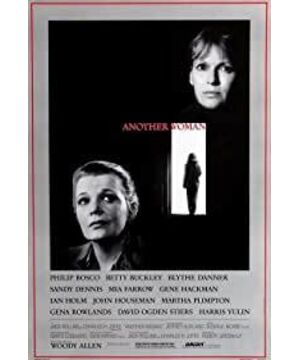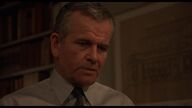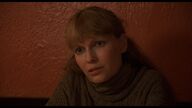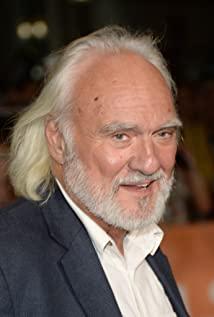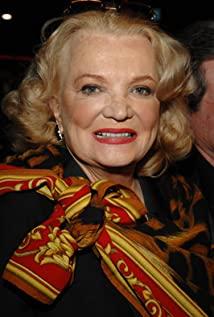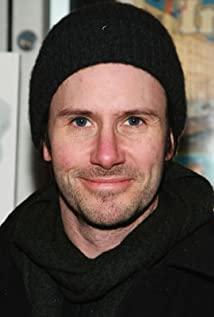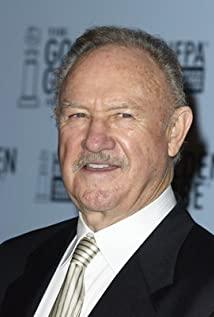Even if a diligent and talented director like Woody Allen is rare in film history, the pros and cons of his works are obvious. "Another Woman" in 1988 is the 17th work directed by Woody Allen. Up to this time, Woody Allen's most outstanding works were only four: "A Fool in Prison" in 1969, "Annie Hall" in 1977, "A Story of Stardust" in 1980, and "The Legend of West Lie" in 1983. In these 17 movies from 1969 to 1988, Woody tried a variety of movie themes: the humorous and absurd "Fools Havoc in Banana City", the serious and indifferent "Deep In My Heart", and the segmented "The Book of Sex", the lighthearted "Radio Age", the beautiful-looking "A Midsummer Night Dream". . . . . . Over the past 19 years, Woody has continued to accumulate, grow rapidly, and actively explore. When filming "Fools in Prison", he learned from the editor Ralph Rosenblum to add the surprise effect of the soundtrack to the comedy; when filming "Annie Hall", the photographer Gordon Willis Jean He realized that the original speaker was not in the lens; when shooting "Manhattan", he learned from Gordon the technique of making black-and-white movies, and mastered the technique of light and shadow and contrast between light and dark; when filming "The Legend of West Lie" , He learned special effects photography; when shooting "The Other Woman", he experienced poetic photography from Ingerman Bergman's queen photographer Sven Nickwest. If you pay attention, close-up shots are used extensively in "The Other Woman", which delicately express the emotions of the heroine Marion. These close-up shots are delicate, accurate and not deliberately artificial, and are very suitable for expressing delicate emotions in serious dramas.
In the 19 years he has been in the directing industry, this comedy master has been tired of nonsensical comedies, even comedies themselves. He constantly tried to make serious dramas that did not suit the audience's appetite, and the elements of comedy gradually diminished in his films. Woody is a serious and pessimistic person deep in his heart. He increasingly wants to express his pain and his views on the world to the audience. Perhaps because he is a fan of Ingerman Bergman, he is very eager to make serious works to succeed. "Deep in My Heart", "Manhattan", "Sisters of Hannah", "Sentimental Nine Moon Sky", "Another Woman" are all such serious works. These works began to seriously express the contradictions in women's hearts and the subtle emotions between women. "I rarely care about male protagonists unless I play them myself. I like to explore women's psychology in movies, plays, and books, especially those smart women." --Woody Allen
During this period, the character elements in the serious feature films that Woody shot on the topic of women became more and more single and overlapping. He always expressed his core thoughts repeatedly. "Sisters of Hannah" is the PULS version of "Deep In My Heart", and the relationship between the characters in the film overlaps greatly. The untalented second sister in "Deep In My Heart" lives in the shadow of the genius eldest sister. She just complains and complains, not knowing why she always fails to make a career. The second sister in "Sister Hannah" is more personal and free. She relies on her elder sister and obtains financial help from her, but expresses her disgust for the elder sister's belief that she has no talent in her bones.
In "Another Woman", the eldest sister Marion learns smartly, and his father interrupted his younger brother's tuition to train his sister to become a professor of philosophy. When she grows up, her sister often pays to help her brother who has never achieved anything. While the younger brother thanked his sister, he also hated such an excellent sister. These plots and opinions are no different from what we saw in "Deep In My Heart" and "Sister Hannah". And Marion confessed that he was facing the fear of aging in "In Another Woman", which is roughly the same as Diane's sigh of old age in "Sentimental September Day".
It can be said that Woody Allen has been chasing Ingmar Bergman's footsteps since "Deep In My Heart" in 1978, but it is a pity that Woody's thoughts about female emotions are too delicate, and at this time his expressive ability is still limited. Without reaching the peak, these serious films of his possess rich photographic skills, but lack the shocking emotion that shocks the soul, so that these films look like mother-in-law women's autobiography. The lack of necessary drama and thought-provoking thinking is the biggest shortcoming of these films. In the exploration of serious movies, Woody, as the director of this period, seemed slightly mediocre in terms of the movie itself.
View more about Another Woman reviews


